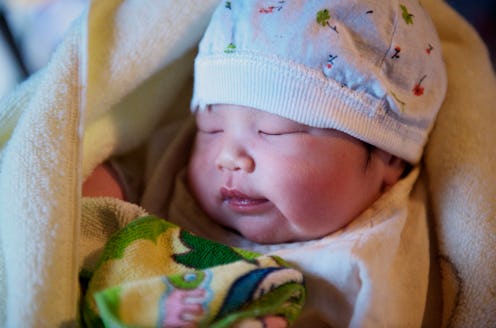News
What If Babies Were Created With 3 DNA Donors?
This week, the FDA is considering whether to approve controversial, potentially groundbreaking research: The use of three people's DNA to create a baby, in order to protect against genetic diseases. The FDA must decide whether to approve further research into the budding science, which could have huge applications for parents looking to protect a child from an unlucky genetic legacy.
A baby with three sources of DNA? It might sound rather science-fiction-y, but the research is anything but trivial. By swapping the nucleus DNA of a different, genetically healthy woman into the prospective mother's eggs, the hope is that, after fertilization, the baby would possess the first woman's healthy mitochondrial DNA (mDNA.) The child would still have traits from their mother's genes, leaving the baby their mother's child.
This could, theoretically, prevent a host of genetic illnesses which originate at the level of mitochondria, affecting some 1 in 5000 American children.
The research is opposed by various groups, who are, understandably, wary of the effect of genetic tampering on human society. Specifically, they fear that such dramatic medical advances and genetic discoveries could prompt the feared "designer baby" enterprise, ushering in a macabre new world of childbirth in which a baby's genetic traits can be pre-selected.
Their concern is, simply put, a form of the "slippery slope" argument: That what seems like a fruitful and humane avenue of medical research could be the starting point for a grim new norm in genetic ethics. There's also a fear that, as the changes are passed down throughout generations and populations, now-unforeseen health consequences could occur and spread.
Marcy Darnovsky, director of the Center for Genetics and Society, wrote in an open letter to the FDA that the idea does seem compelling, at least at first — but he considers the safety and ethical concerns "overriding."
The researchers involved, however, believe they're on track to cutting down on devastating genetic disorders. Dr. Shoukhrat Mitalipov, the leading U.S. researcher in the field who presented his case to the FDA Tuesday, feels that his work has been unfairly pegged as "gene modification," preferring instead "gene correction," according to the Washington Post.
We want to replace these mutated genes, which by nature have become pathogenic to humans. We're reversing them back to normal, so I don't understand why you would be opposing that.
Mitalipov's research and team have already produced five healthy, mitochondrial DNA-swapped monkeys, and he's seeking approval to test a group of woman who carry dangerously defective genes, which could leave their children with problems like epilepsy and organ failure.
It's not clear yet whether the FDA will find the research safe to be conducted on women in the first place, beyond ethical concerns about genetics. One thing is for certain: whatever happens next will be a fascinating insight into what happens when potentially life-saving research and established ethics collide.
